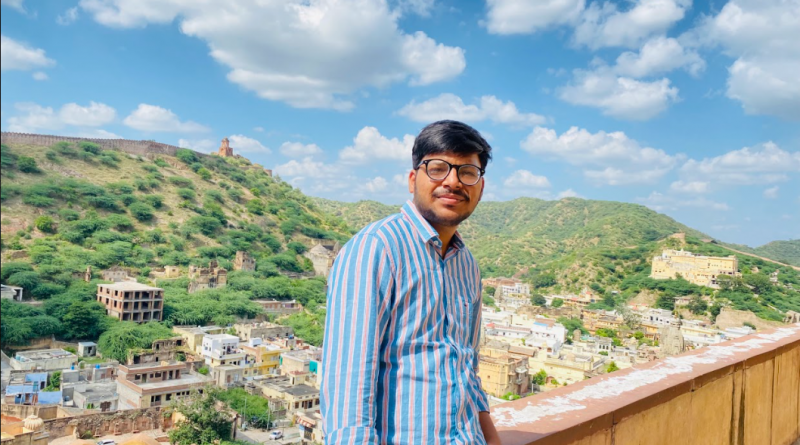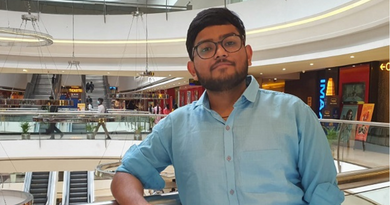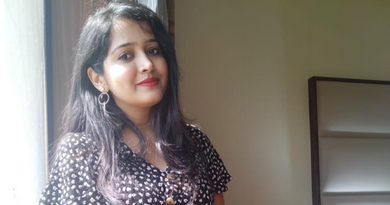Automobile internship in Germany – How I reached the finish line and won the race.

About the Author: Arjun Bhat, a student of People’s Education Society University, talks about his automobile enthusiasm and how he landed at the heart of this sector, Germany.
In the words of my favourite racing driver, the late Ayrton Senna, “I have no idols. I admire work, dedication, and competence.” I can think of only one race of people who would fit that description – Germans. It’s rather ironic as this quote was spoken by a Brazilian driver while racing for a British team (McLaren), running a Japanese engine (Honda)! I had always wanted to work with Germans, learn their ways and work culture, and understand how they manage to operate at maximum efficiency while still being human and not letting themselves turn into robots. And this is how my story starts.
As an automobile enthusiast, I had joined our college’s racing team in my second year and worked for a year and a half before leaving the team due to differences in opinion over many technical matters. After that, in my 6th semester, as they would say in the ‘Divergent’ series, I was ‘factionless’. I had no team, and my automobile enthusiasm and the urge to work on something, in a team, for a team project, wasn’t being satisfied. With the automotive industry shifting towards electric cars, I needed a way to get automotive related projects in my resume and make myself ready for the industry. That’s why I started a hybrid 2-wheeler team and was going to spend the entire summer working on that. This was when our college announced the foreign university internships. Our university has a tie-up with a few universities abroad. The mechanical department, where I study, has a tie-up with the University of Duisburg-Essen in Germany for mechatronics, the Swansea University in Wales for thermo-fluids, and the University of Edinburgh in Scotland for aerospace. Every summer, few students are selected to pursue summer internships at these universities. Students submit their CV and SOP to the department, after which based on one’s area of interest, previous experience in the respective field, and CGPA, shortlisting is done. I applied for the internship at the University of Duisburg-Essen, Germany. 5 students were shortlisted based on previous automotive work and CGPA. After communicating with the German university, the top 2 were chosen based on CGPA, and I was one of those two students! My joy knew no bounds!
I will skip the VISA process and legalities and go straight to the part where we (my classmate and I) landed in Dusseldorf, Germany. German mood set in instantly, as I tried communicating with the little German I knew. I instantly felt at the heart of the automobile sector when I had to take a Mercedes taxi from the airport to my accommodation, and I knew it was one of the many checkboxes from my list that I was going to tick. After reaching, we got on with the formalities of registering with the university, and had a tour around the university campus, or rather, the university “city” as the universities in Germany are spread out throughout the city. And what a beautiful campus it was! Next day, we visited the department we were going to work in, the famed Chair of Mechatronics. We were assigned our project. We had to work with the university’s formula student electric race car team, called as “E-Team”. Their upcoming car was going to take part in the Formula Student Spain event in August, and they needed programming of the sensors like the yaw rate sensor, steering sensor, wheel speed sensor, and brake pressure sensor. They were planning on using the test programs in their car to gather valuable information on driving dynamics to create traction control (system to prevent loss of traction, or grip, in a car) and torque vectoring (a system that works with the steering system to increase the torque supplied to the outer wheels when executing a turn to improve cornering) systems for the car to improve the performance and drivability. It was exactly what I needed to complete my resume. I had worked on a combustion powered car with my college team. I was working (and still am) on a hybrid vehicle, and now I was going to gain exposure to an electric car. From being factionless a few months back, now I had 2 factions! I was already starting to feel Divergent!
Our work started immediately – after all, these are Germans we are talking about! We were introduced to the team and were shown the car. It was a good car but could have used a lot of improvements. Once we had the necessary software and data sheets to start our coding, we went ahead with finding a logic to get the sensors working and ready for calibration. The work was more electronics than mechanical, and since I was skilled in mechanical drivetrains and core mechanical components, this internship soon turned out to be very difficult. The concept was so new to us that it took us an entire week, and 2 meetings, to get it working; however, the amount of satisfaction it gave, after working outside of our comfort zone, was unparalleled. And the dedication of Germans was simply awe-inspiring. For them, it’s work with one hundred percent focus and efficiency from Monday to Friday, complete relaxation on the weekends, and back to work on time on Monday. They were never late, and the astonishing thing about their schedule was how they finished work right on time – if their schedule ended at 5pm, they neither finished it at 4.55 nor at 5.05 pm. They finished it at 5 pm sharp and were gone a few seconds later. Such punctuality would seem robotic until you saw how kind and friendly they were! They don’t speak English much, but if you are in need of help and don’t know German, they will do everything in their power to help you, even going to the extent of using all the sign language they can think of, and will even try to find somebody who can actually help you understand. Almost every morning, random people greeted us while walking on the road or waiting at the bus stop.
Back to the internship, which had taken a very ‘electronic’ turn, we had figured out the basic logic for all the sensors we were asked to program and had started to get a grip on things. Of the 4 sensors assigned to us, 2 were completed, and then came the time for testing and calibration of the sensors on the previous year’s car. Even though the car was never run in front of our eyes, just loading our program into their car and checking for values, rerunning the code and recalibrating until the values were within the permissible limit, made us feel like genuine automobile engineers as a part of a race car team working towards achieving perfection. With our remaining doubts cleared by the team leader, the rest of the work was completed like a breeze. We received praises from the team leader, our project guides, and the head professor, even before we started our project presentation. Our report too was well accepted by the department, and the work was found useful by the team.
Amidst all this intensive work, I did make the best use of my German trip, and more importantly, my Schengen Visa, which allowed me to enter countries in Europe like Germany, Belgium, Netherlands, France, Switzerland, etc. I went on trips to Berlin, Essen, and Aachen in Germany, and then to Netherlands and Belgium. Berlin, the capital, was the perfect blend of modern culture with old-school infrastructure. Aachen, being a border city, had the “Drielandenpunt”, the intersection of the borders of Germany, Netherlands, and Belgium. Belgium was simply beautiful, especially Brussels and Ostend (the closest we could get to the English Channel). The infrastructure was awe-inspiring and superb. Not to forget, being in Germany, the very place where the automobile was created, I came across some historic cars, especially the Porsche 911s of the 1970s, with their 2L+ air-cooled flat-six engines. Those are immortal engines! All in all, the “Schengen Experience”, as I would like to call it, was the perfect transformation for me. It was the experience I needed for expanding my knowledge and skill set, and for exposing me to the outside world, full of challenges and opportunities. I even learned how to cook – best value addition ever! And finally, it even helped me imbibe into myself the German culture of dedication and meticulousness that I had always admired!
Confused about your skill set and need some exposure? Apply to these latest mechanical engineering internships and kick-start your career.
Editor’s note – If you also have an interesting story to share, you can now participate in Your Internship Story Contest 2017 and win cash prizes and goodies worth INR 1 Lac!



